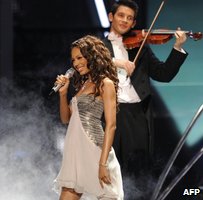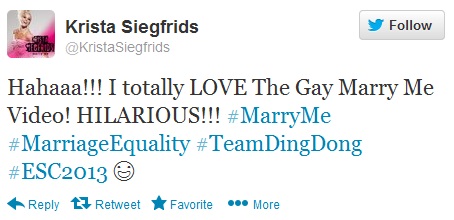It’s frustrating being a British fan of the Eurovision Song Contest. Whether you’re staunchly patriotic or just want your country to be represented by something that isn’t fundamentally embarrassing, it seems the United Kingdom and the BBC have found it difficult to know exactly what to do with ESC over recent years.
With a few notable exceptions, the past decade has been largely unsuccessful for a nation that used to be all but guaranteed a strong showing on the scoreboard. Five wins and fifteen second places have been succeeded by a string of flops, starting with zero-scoring legends Jemini (although the rot arguably set in with Nicki French and Lindsay D) and continuing with the likes of Javine, Scooch, Andy Abraham, Josh Dubovie and last year’s entrant, the hapless Engelbert Humperdinck.
So what exactly is the problem? In this piece I’ll be looking at some of the popular myths surrounding the Eurovision Song Contest in the United Kingdom, examining the BBC’s motivations with regard to the competition – and trying to identify which of these factors, if any, are responsible for the UK’s frequent failure.
Times change
First of all, it’s worth noting that the contest has changed a great deal since the United Kingdom’s phase of near-unbroken success. “Europe” has evolved and expanded far beyond the traditional core participants, so the competition has become tougher, at least statistically speaking – all else being equal, each country “should” only win once every 40 years or so!
Moreover, the change to the free language rule from 1999 onwards coincided almost exactly with the general downturn in fortunes for the UK, Ireland and Malta, who had previously benefited from being the only countries allowed to sing in English. Although a direct correlation can never be proven, it’s hard to imagine Turkey or Finland winning the contest in the days when their lyrics had to be in their native tongue – meaning that a key advantage for the UK has been eliminated.
All the same, the results achieved by the likes of Jade Ewen and even Blue (who reached the top five with the televoters but were punished by the juries for an underwhelming performance at the Friday night jury final) show that the rest of Europe is quite happy to vote for the United Kingdom if they think they deserve it.

Mind that violin!
Myth-busting
This brings us to the first problem: to viewers in the rest of the continent, it often seems as if the UK takes ESC far less seriously than everyone else. And indeed that may be true. But it’s irrational for Brits to cry “Why does everyone hate us?” – myth #1, if you will – when you’re not putting in the effort in the first place. The British music industry is one of the country’s few remaining successful exports, and music from the British Isles enjoys commercial success around the world. So it’s only natural that viewers and jurors across Europe look out for the British entry and expect it to be of a certain standard – and are disappointed when they get “That Sounds Good To Me” instead. (Indeed, sometimes it’s not even about the songs: in 2000, German commentator Peter Urban wryly expressed his dismay that the country that gave the world Vivienne Westwood should have come up with such an awful styling for Nicki French!)
Part of this problem of expectations vs. reality is founded in myth #2: “Doing ESC is career suicide”. This has been a popular claim and, some might argue, a self-fulfilling prophecy since the days of Sandie Shaw – and she won the thing! Yet there’s no real evidence to suggest that this has to be the case, at least outside the UK: even recently, big-selling acts like Patricia Kaas have emerged from the contest unscathed, and more local stars like The Ark have failed to impress on the scoreboard yet retained their fanbase. So maybe it’s precisely because the UK fails to take the contest particularly seriously that the risk of “failure” – which corresponds to “not winning by 100 points” in the minds of many British viewers – is seen as too great to take.
One of the reasons the contest has an image problem in the UK – and it undoubtedly does, even if the likes of Lordi, Rybak and Loreen have enjoyed healthy sales after winning – boils down to myth #3: “There’s no point in doing ESC because the other countries all vote for each other anyway”. Obviously this is nonsense (even if Bonnie Tyler herself has alluded to it in some of her interviews so far – but hopefully that won’t be the official line from the UK delegation in Malmö). Of course there are diaspora votes in Eurovision, and of course neighbouring countries with shared histories, musical tastes and musical scenes will tend to vote for each other’s entries – to deny that would be naive. But to suggest that means there’s no point in trying to compete is simply defeatist. An entry that’s good enough will always cut through the pack and rise to the top of the scoreboard, regardless of whether a certain chunk of the other votes are “predetermined” or not – and a country like the UK should, in theory, have a strong enough music industry to be actively competing for those “unallocated” votes every single year.
A question of motivation(s)
I would argue that these attitudes are at the heart of the “problem” of the UK at Eurovision – a vicious circle that ends up with the the country underperforming almost because it’s expected to underperform. And although myths can be disproven, this brings us to the other side of the coin: does the BBC really want them to be disproven?
If you believe the yearly rumours, there is no shortage of big names lining up to fly the Union Flag at the contest. Morrissey and Radiohead are said to have expressed an interest on numerous occasions but were put off by having to compete against other artists in a national final (a barrier the BBC has since removed) – while electro duo Hurts are certainly up for it, to the extent that they’ve pronounced themselves willing to represent Russia if necessary. So what’s stopping the BBC from simply approaching a big chart act every year and saying “here’s some cash and three minutes of prime-time, Europe-wide exposure in front of an audience of more than 100 million – pick a song and do whatever you like with it”?
As a public broadcaster funded by the licence fee, the BBC has a responsibility to be financially prudent and transparent in terms of what it’s spending, and the idea of simply flinging some bank notes at an already wealthy singer or band probably wouldn’t go down particularly well – least of all with the Murdoch press, which already has its knives out for the organisation. But the process the BBC has adopted since scrapping the national final a few years ago is far from transparent either – who came up with the idea of Engelbert Humperdinck? Why was “Believe In Me” deemed to be the right song to represent the UK in 2013? How much money is there in the pot for Eurovision in the first place? – so, while giving the public say is a dangerous game (just look at Scooch), it’s hard to know exactly what the BBC’s motivation is when it comes to picking an act for ESC.

British representatives/War criminals (delete as applicable)
Which leads to another, perhaps more worrying question: if a sizeable portion of British viewers of the Eurovision Song Contest believes that “everyone hates the UK” and “they all vote for each other anyway”, is it not, in fact, in the BBC’s interest to play along with and encourage these stereotypes? The “us vs. them” mentality is a popular one – this is a country where a good number of voters are in favour of withdrawal from the European Union, after all, and many Brits do watch ESC because it highlights our difference from, not our similarities with, continental Europe.
For many years, of course, this attitude was adopted by former BBC commentator Terry Wogan, until his tone became especially xenophobic during the 2007 and 2008 events and his position effectively became untenable. His replacement, Graham Norton, has started positively but arguably falls into some of the same old traps – but if it’s just hardcore Eurovision fans who see it that way, whereas a “sneering at Johnny Foreigner” approach is exactly what the majority of the viewing public wants and expects from Eurovision, then it can be argued that the publicly funded BBC should give them what they desire.
And the same applies to the songs selected. Despite the victories of Lordi, Lena and Loreen, the average British viewer’s impression of Eurovision remains deeply rooted in the “boom-bang-a-ding-a-lations” era, whether because the UK was so successful “back then” or because they simply haven’t noticed the extent to which the contest has become more contemporary and chart-friendly in recent times. As such, it was hardly a surprise when the aforementioned Scooch won the UK final in 2007 – yes, the producers did their best to avoid it by showing clips of the entries in the adjacent draw positions (“Look! Up-tempo novelty entries! Wouldn’t a ballad here be just great?”) and getting a (non-voting) international jury to express a clear preference for Cyndi and Big Brovaz instead, but the song that looked and sounded most “like a Eurovision entry” to Joe Public always had the best chance of winning the day.
So once again, you start to wonder whether sabotage à la Scooch was the BBC’s plan all along (at least once they realised they didn’t have an ESC winner at their fingertips). The group’s performance and poor result certainly made the headlines, they’re fairly well-remembered even now in a way that earnest balladeer Cyndi wouldn’t have been with the mid-table finish she would likely have achieved – and if you can’t win the contest (which, as we established earlier, has become increasingly difficult anyway), maybe the next best thing really is to flop, at least in terms of grabbing attention and stimulating public debate. Jahn Teigen can tell you a thing or two about that, and that was in the era before social media changed the way we (group-)watch television, back when nobody knew what “#EPICFAIL” meant.

Some people know their way around a hashtag
The future
So how do you solve a problem like the UK? The Eurovision Song Contest is a hugely popular event, attracting reliably high viewing figures for the BBC – but the water-cooler discussion the Monday after invariably focuses on what, as fans, we might consider to be “negative” aspects, from the imbalances of the voting system to the invariably poor performance of the British entry.
One obvious approach would be for the BBC to try and actively reshape attitudes from the top down: instruct its commentators to lay off the bashing a little (although, to be fair, the semi-final commentaries tend to focus more on the fun of it all); use channels like BBC THREE to drum up attention, e.g. by reintroducing preview shows in some format or other; get Radio 1 and Radio 2 to play (and playlist) some of the more contemporary/radio-friendly songs from each year in the run-up to the contest; harness the huge power of social media to get the UK entry trending worldwide and to rack up seven-figure YouTube views… The options are countless and readily available, but again, this all assumes that the powers-that-be actually want to make the change – when in fact the status quo might be perfectly acceptable to those in charge.
In any case, none of this works without the UK entry being a credible song that the population as a whole (and, ideally, the rest of Europe) can get behind. This is where the BBC’s decision to opt for internal selections can (and should) really come into its own, especially since the interest among established artists is there if someone is willing to tap it. And while the likes of reformed boyband Blue, pensioner Engelbert and now Bonnie Tyler haven’t exactly hit the mark in terms of street cred, one thing that can be said is that none of “I Can”, “Love Will Set You Free” and “Believe In Me” are what you might call “typical Eurovision songs”, at least from a British viewer’s perspective – so perhaps the BBC is trying to subtly change the image and the perception of the competition by steering it away from “fun” airline stewards and swelling Lloyd-Webber ballads.

Time to believe?
And in that respect, Bonnie Tyler isn’t a bad choice at all. Although a mature artist whose popular peak is undoubtedly well behind her, she’s nowhere near as irrelevant as Engelbert Humperdinck (or as old, frankly), she does still have a sizeable European fanbase and she certainly attracted mostly positive media attention when she was chosen. At the same time, she’s not such a big name that a bottom-10 result will either kill her career or do irreparable damage to the image of the Eurovision Song Contest in the UK – and whatever result it achieves, “Believe In Me” is a solid, decent song that doesn’t miss the target completely, unlike some recent UK entries which really made you feel like there was no point in taking part in the first place.
So those ultra-patriotic British fans I mentioned at the start can look forward to the 2013 competition in the hope that Bonnie Tyler will do some real business on the scoreboard – and those who simply want to avoid humiliation in the name of their country should come away reasonably satisfied too. It’s a happy compromise, even if it brings us no closer to knowing the BBC’s rationale behind the choice of artist and song, or whether it even has a coherent strategy when it comes to the contest. And who knows? If things go very well, Bonnie and the Beeb might just inadvertently solve the problem of the UK at Eurovision.







0 Comments